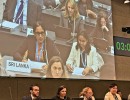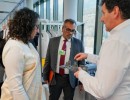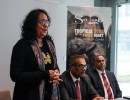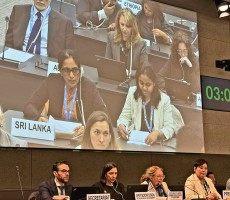
Conference on Disarmament – 27 January 2026
Statement by Her Excellency Himalee Arunatilaka, Ambassador and Permanent Representative of Sri Lanka to the United Nations in Geneva
Madam President,
Madam Secretary-General
Excellencies, Distinguished Colleagues
It is with deep honour, respect and gratitude that I take the floor today for the last time in my capacity as the Permanent Representative of Sri Lanka to the United Nations in Geneva, and to the Conference on Disarmament. I will be concluding my tenure and returning to Sri Lanka in a few days on the conclusion of my tenure in Geneva.
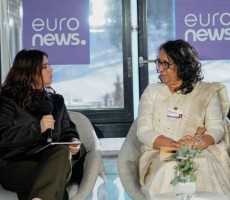
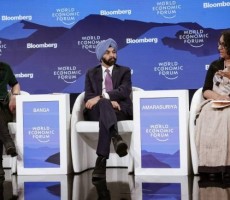
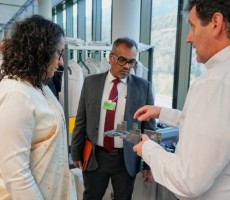
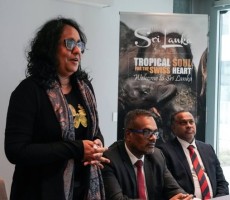
Prime Minister Dr. Harini Amarasuriya attended the 56th Annual Meeting of the World Economic Forum held in Davos, Switzerland from 19 to 22 January 2026 at the invitation of the President and Chief Executive Officer of the World Economic Forum, Børge Brende. Over 60 world leaders from government, businesses, civil society and academia attended the Forum in 2026 held under the theme "A Spirit of Dialogue".



On 02 January 2026, the Permanent Mission of Sri Lanka in Geneva handed over the relief supplies collected from Sri Lankan communities and friends across Switzerland to Dr. Sri Rasamanikkam, CEO of AERO Logistics in Zurich who has graciously undertaken to airlift these items to Colombo.



Commencing the Work Year 2026, at a simple ceremony, the staff of the Permanent Mission of Sri Lanka in Geneva and Consulate General Office in Switezrland, took the oath/affirmation of the public service and reaffirmed their commitment to deliver an efficient and productive service to the public. This was preceded by the hoisting of the national flag and signing the national anthem, followed by two minutes of silence in remembrance of the members of the Tri-Forces and others who sacrificed their lives for the motherland.
As we step into the New Year 2026, we do so as a nation that has shouldered the greatest reform programme and reconstruction effort in our modern history.

As we move forward to the New Year of 2026, it is timely to reflect on the year 2025 that has passed. The year 2025 can be granted as a year having made a number of decisive and progressive steps with a people oriented government.I am confident that, within a new political culture, we were able to strengthen transparency in state governance and lay the foundation for an efficient and corruption free public service.
We can be satisfied with the progress achieved in several key areas during 2025, including economic stability, the increasingly positive and optimistic international perception towards our country, the establishment of transparent systems of governance, and the strengthening of the sovereignty of the legislation system. However, the unfortunate disastrous situation we experienced towards the end of 2025 was a challenging period for our nation. While it deeply moved us all, the spirit of solidarity, compassion, and collectivity shown by Sri Lankans during that difficult situation received admiration across the world.
As we step into the New Year 2026, we hold commitment to overcoming those challenges, healing from the disaster, and restoring the lives and livelihoods that were affected.Moving forward with the goals such as initiating qualitative and sustainable transformation in the education sector, digitalizing all sectors of the public service, creating an enabling environment for entrepreneurs, artists, and creators with innovative ideas to rise on the global stage, and building a compassionate, environmentally friendly society free from drugs and harmful substances I would like to remind, at this moment, that the responsibility of rebuilding this nation rests upon the entire nation, together with the government, transcending differences of ethnicity, religion, or political affiliation, and united by a strong Sri Lankan identity.
Transforming all the challenges we experienced in the past year into sources of strength, I invite you to step into 2026 with renewed energy, hope, and determination.
I extend wishes for a victorious New Year filled with peace, happiness, and prosperity.
Dr. Harini Amarasuriya
Prime Minister
Democratic Socialist Republic of Sri Lanka

As Sri Lanka enters the New Year 2026, the Ministry reaffirms its commitment to rebuilding the nation through principled global engagement, dignified foreign employment, and a modern, sustainable tourism economy. This is a moment for disciplined reform and renewed confidence.
Sri Lanka’s foreign policy is being advanced with clarity and balance strengthening bilateral and multilateral partnerships, restoring international trust, and positioning the country as a reliable and constructive global partner. Diplomacy today must directly support economic recovery, investment, trade access, and national security.
Foreign employment remains a vital pillar of our economy. In 2026, the Ministry’s priority is to protect Sri Lankan workers abroad, expand safe and legal migration pathways, improve skills recognition, and ensure dignity, welfare, and fair treatment for every Sri Lankan serving overseas. A skilled and protected workforce strengthens both remittances and national credibility.
Tourism is being repositioned toward quality, sustainability, and resilience. Our focus is on environmentally responsible tourism, higher value offerings, regional balance, and global standards that protect communities while enhancing Sri Lanka’s international brand.
Rebuilding Sri Lanka requires institutional strength, clean governance, and active engagement with the world. Guided by the Government’s vision, the Ministry will continue to work with international partners, the private sector, and the Sri Lankan diaspora to secure growth, opportunity, and long-term national stability in 2026 and beyond.
Vijitha Herath
Minister of Foreign Affairs, Foreign Employment & Tourism
Sri Lanka



